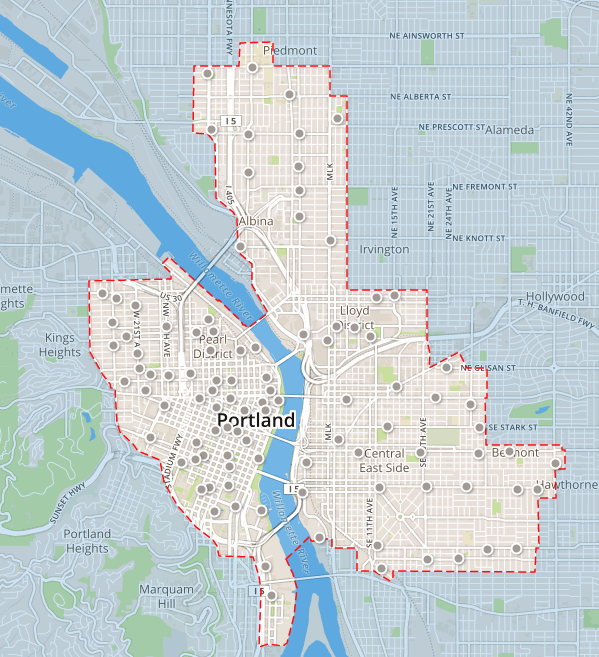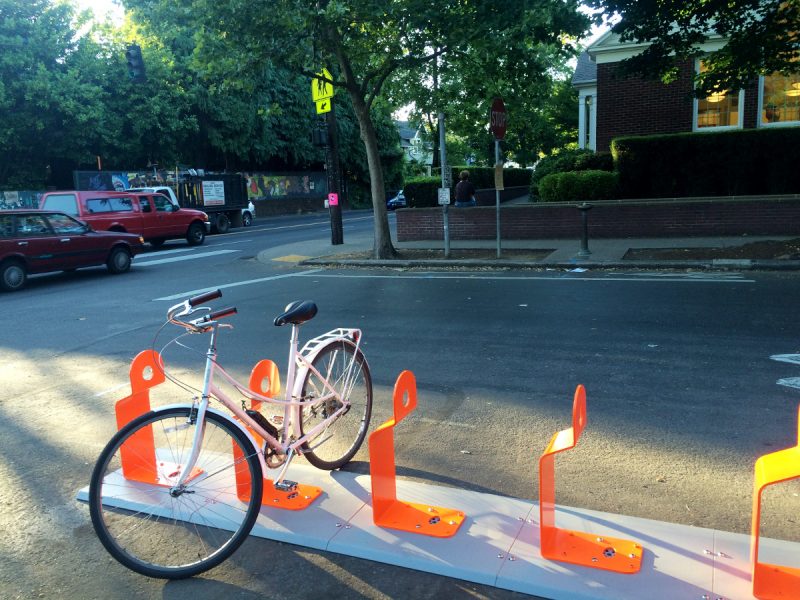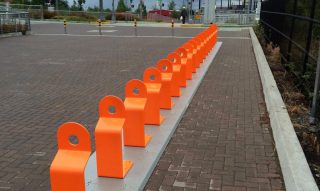The first publicly visible news of Portland’s long-awaited Biketown system has arrived.
Its vessel: 100 rows of simple, sturdy metal tongues painted fluorescent orange, each with an oversize eyelet through which bike share users will thread the system’s built-in U-locks.
These rows (“stations”) will be spread around the 8.1-square-mile service area that opens for business July 19. Twenty of them will have solar-powered pillars with digital screens (“kiosks”) that let you purchase a one-time ride or a daily or annual membership on site with your credit card.

People who’ve used bike sharing in other U.S. cities may be surprised to see that these stations are different from many: instead of the wheel-grabbing “smart docks” developed for the widely used B-Cycle and PBSC systems, Biketown is the continent’s biggest launch for “smart bikes” and (therefore) for what you might call dumb docks. They don’t require wiring or even moving parts. They’re just bolted into the pavement.
The fact that all the necessary electronics are on the bikes themselves is what’s supposed to make Portland’s system cheaper than most on a per-bike and per-station basis. Smart-bike systems from the same manufacturer are in use in Phoenix, Santa Monica, Tampa, Topeka, Boise, Orlando, Ottawa, and Hamilton.
The stations will continue arriving around town over the next two weeks, Biketown manager Dorothy Mitchell said Tuesday. Then just before launch, the 1,000 bikes will be distributed for the first time.
Advertisement
For the moment, as the short promotional video below shows, the 1,000 bikes are stored together in an undisclosed location:
Mitchell said Tuesday that 550 annual members have registered via the Biketown website. That’s up from 428 on June 15. The first 1,000 who sign up before launch are receiving a free t-shirt and a special card identifying them as a “founding member.”
Seattle’s Pronto system had 1,154 members by the end of the month it launched, but its pricing model is very different.
Seattle’s Pronto system had 1,154 members by the end of the month it launched, October 2014, peaking at 3,186 a year later. Seattle has in the past projected that a 1,000-bike Pronto system would aim for 8,000 members to be healthy. But Pronto’s pricing model is very different than Biketown’s; among many differences, Seattle’s annual memberships cost $86 per year to Portland’s $144 (billed in $12 a month installments).
In any case, to succeed Biketown will need to do better as a business than the moderately troubled Pronto has so far. Motivate, the New York-based bike-share operator that has assumed all the risks and half the rewards of Biketown’s performance over the next three years, is counting on Portland’s advantages (flat terrain, no adult helmet law, a beginner-friendly pricing model, spillover bike parking, a bike-friendly culture, some of the nation’s best station density and a generally larger network of destinations) to make up for Portland’s challenges (lower density and lower transit commuting rates).
Some companies and institutions are likely to offer discounted or free memberships to their employees, students or members. Any memberships that result won’t start coming into the system for another month or two.
Considering that Tuesday was the second business day of the Biketown launch month, it’s anybody’s guess what’ll happen with memberships by the end of this month — especially as brightly colored objects continue to appear on 100 street corners around the city. Some of them will even take credit cards.
Update 7/8: We’ve removed the lead photo because it featured my bike leaning against a bike share station for scale. We didn’t want to set a subconscious bad example — people shouldn’t park their private bikes there.
— Michael Andersen, (503) 333-7824 – michael@bikeportland.org
Our work is supported by subscribers. Please become one today.




